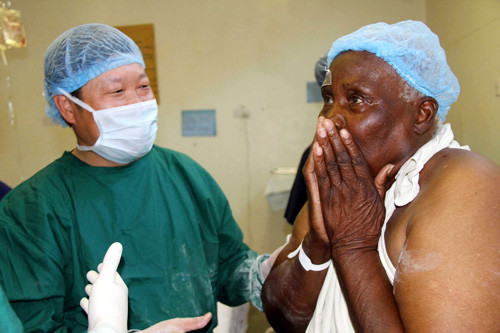|
 |
|
BRIGHT FUTURE: A Zimbabwean patient regains sight after receiving a cataract surgery performed by Chinese doctors in Harare in November 2010 (LI PING) |
China-Africa cooperation has gone through a growth spurt in recent decades. Non-governmental exchanges have been especially successful in encouraging people from both sides to learn more about the other—and today, this cooperation is becoming more oriented toward African needs.
"The assistance we need from China is to help us build the ability for self-development," explains Luka Biong Deng, an economist and former governmental minister from South Sudan. His words indicate a new direction for China-Africa cooperation.
In recent years, NGOs have increasingly played an active role in cooperation between China and Africa. Most of the organizations are dedicated to improving the lives of people through a variety of livelihood programs.
In November 2010, the China NGO Network for International Exchange (CNIE), together with other Chinese organizations, carried out the medical program "2010 China-Africa Brightness Action in Malawi and Zimbabwe." Participating Chinese doctors gave operations to more than 600 cataract sufferers and cured many patients afflicted with other eye diseases, all at zero cost for the patients. Then in 2011, CNIE helped to drill three water boreholes for people in Kenya and South Sudan. Other projects related to AIDS prevention and treatment and environmental protection were also carried out.
Rita U. Zirimwabagabo is vice president of the Imbuto Foundation, an NGO in Rwanda. In July, she arrived in China on the invitation from CNIE to attend the Second China-Africa People's Forum. The forum was held to provide an opportunity for Chinese and Africans to get together, to speak and to be heard.
Surrounded by new colleagues from China and Africa, Zirimwabagabo raised her own ideas during the discussion. "What Africa really needs is China's experience," she said. "China should equip them—teach them to fish, not just give them fish. Africans should learn to do it ourselves."
Zirimwabagabo believes that business cooperation is not enough for Sino-African relations. Western countries, she says, used to view Africa as a place to extract benefits through economic exploitation, but China should take a different tack.
Her idea was echoed by Alebachew Zenebe, Executive Director of Basic Education Network Ethiopia. "The cooperation model of relying on outside help has only just ended," said Zenebe at the forum. "It's time to build our ability of self-development."
Concerning China's assistance to Africa, many Africans, although grateful, believe that a give-and-take model is not enough for the continent in this new era.
Programs with other dimensions are now being welcomed. One such program is the "China-Africa Law Talents Training Program," which is organized by the China Law Society. It aims at helping African countries produce more professionals in the legal arena.
Many of the Africans at the forum want to make sure that outcomes from NGO involvement are win-win. "We should think what we can do for China," said Joaquim Alberto Chissano, former President of Mozambique. He believes it's not reasonable to have China always be the donor, and self-development has extra importance for Africa now. "You cannot develop without prospering your neighbor," he said.
To better serve their new direction, some emerging programs are serving cooperation in a more practical way for both sides. The "China-Africa High-level Business Talents Training Program" is one of these.
As part of the program, African trainees come to China to study for a year and a half. All costs generated during their training are paid by Chinese investment. The shortage of high-level business talent in Africa is a bottleneck in Sino-African economic cooperation, and the program should benefit both sides.
Cooperation in technology was also discussed at the forum. Emphasis was placed on bringing in technologies that are really needed in Africa. "Technology transfer has always been the focus of assistance from China to Africa," said Wei Jianguo, Secretary General of the China Center for International Economic Exchanges.
Efforts made by NGOs have garnered praise from African governments. At the forum, Ethiopia's First Lady Azeb Mesfin went on record to say, "As a member of parliament, I know how difficult it is for a government to meet its people's need with a limited budget. So, it's very important to cooperate with NGOs."
Email us at: zhengyang@bjreview.com | 